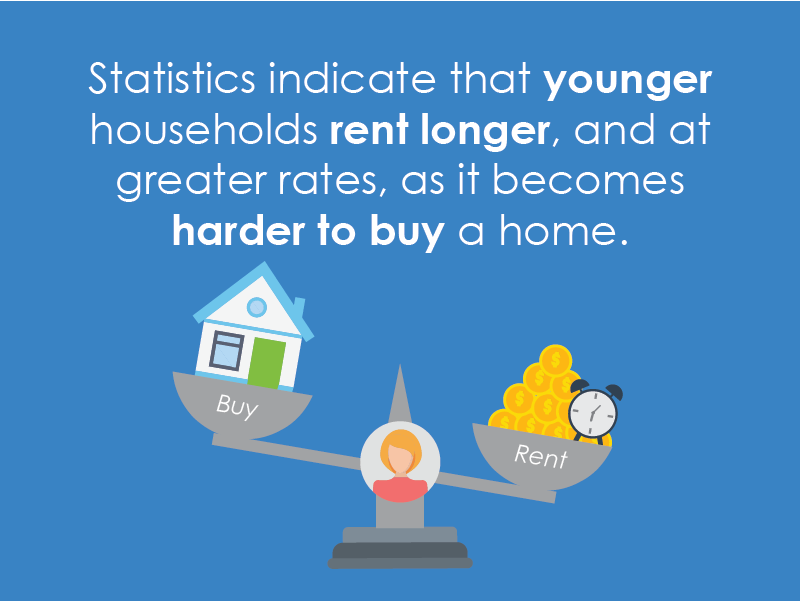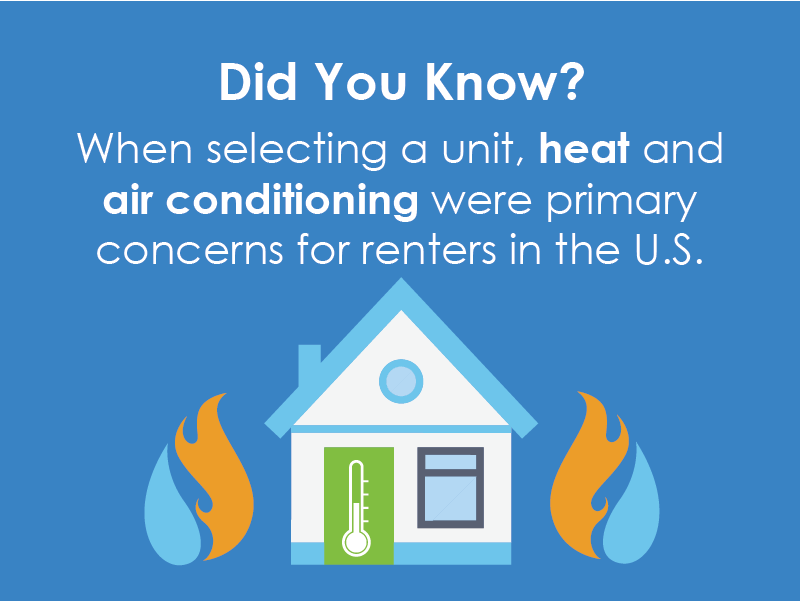Apartment hunting can feel like a full-time job. There is no shortage of rental websites and apps to explore, but many available options are either too expensive, too far away or too disappointing. If you do manage to find something that is both affordable and inhabitable, you end up competing against 20 other candidates.
Finding a good apartment takes work, but, with some persistence, patience and a bit of luck, your hard work can pay off.
Renting is on the rise
Part of the reason why finding a good apartment is so challenging is because the demand for rental units is rising. Statistics indicate that younger households now rent for longer—and at greater rates—because buying a home has become more challenging. The small supply of single-family homes, coupled with record-high prices, have forced some interested buyers to stay in the rental market.

Interestingly, roughly one out of every 20 renters in the U.S. lives in the same apartment for more than 20 years. So, when someone finds a really good unit, they’re reluctant to let it go.
The difference between condos, co-ops and apartments
Apartments aren’t the same as condos or co-ops. The main thing that sets them apart from other housing options is that apartment units are rented out to residents. The building has one landlord, and that could be an individual or a property management company.
A housing cooperative, or “co-op,” is a housing unit or building that is owned and controlled jointly by a group of individuals who have equal shares, membership and/or occupancy rights. Market-rate co-ops give owners the right to sell their shares whenever they want, for as much money as they want.
When you buy a condo unit, you own that unit. You also share ownership of the common elements and assets of the building and community. There are multiple owners in condo buildings, and owners may be able to rent their units out to tenants.
Some people are apprehensive about the idea of becoming a long-term renter. However, you can still build wealth if you don’t own a home.
Tips to finding your perfect apartment
1. Establish a budget, anticipate rent increases
Before you begin searching, you must determine how much you can afford to pay each month. It’s critical to be realistic about what you can afford. If there isn’t wiggle room in your budget, make sure you set your limit slightly lower ($100 -$200 less) than you are willing to pay. That’s because rent goes up, sometimes annually, and there might be additional fees that you hadn’t considered. For example, utilities might be extra, or you may be asked to pay a fee for your pet.
In a perfect world, your income would be three times your monthly rent payment. But in big cities, some end up spending up to half of their income on rent. This is particularly true for young adults who are still getting established. If you find your budget is really limited, you may consider renting with a roommate.
2. Identify neighborhoods you love and the ones you don’t like
Once you have established a budget, you can begin looking at places that might be a good fit. Living downtown will be more costly, and you might get more space for less money if you aren’t as close to the center of a city.
Consider things like proximity to transit, work, green space, grocery stores and pharmacies. Saving $75 a month may not be worth it if you have to travel half an hour just to get essentials.
Check out the activity level of the neighborhood as well. Some people like attending parties and busy restaurants on weekends, while others appreciate peace and quiet. These factors will greatly influence how much you enjoy your living situation.
Up-and-coming neighborhoods typically have lower rent rates, and some allow you to be close to the core without spending a fortune. The downside is that, initially, the area may still offer little in the way of stores and services.
3. Timing matters
If your city houses a lot of college students, forget about trying to find a place between May and September. This is a busy time and rates may increase due to high demand. However, if you can wait until the end of October, you’ll have less competition and may find better rates.
Few people like the idea of moving in the winter, but this can be a smart option if you’re trying to stretch your budget.
4. View the unit before you sign anything
Don’t sign a lease before you see the apartment in person. Pictures can be edited or manipulated so that only the best parts of the unit are visible. Touring the apartment allows you to see how new or old fixtures are, what the condition of the floors is like and what your neighbors might be like.
It also gives you the chance to think about what’s missing from your list of things you’d like to have. For example, when selecting a unit, heat and air conditioning were primary concerns for renters in the United States. Not all units have a cooling system, but you probably wouldn’t think about that while browsing online.

You are encouraged to check potential apartments thoroughly for things like low water pressure, broken windows, rotting floors and bad wiring. If you see something you don’t like, but the issue isn’t a deal breaker, see if you can negotiate for upgrades before making a final decision.
5. Ask about perks, upgrades and amenities
Speaking of upgrades, ask the landlord or person showing the unit about recent upgrades, in-suite laundry and any other amenities that would prove to be valuable to you. Some buildings might have a residents portal that allows tenants to receive notices electronically, make reservations for the BBQ area or entertainment room and pay rent online. These little things can make a big difference, and you don’t have to worry about writing and delivering checks at the beginning of every month.
Old apartment buildings may have a simple gym and a laundry room. But there are newer developments out there that offer just as many facilities as a condominium does.
6. Be clear about your expectations and requirements
While renters often feel pressured to make a good first impression with a prospective landlord, that doesn’t mean you shouldn’t ask questions or let them know about your requirements. It’s better to be honest and not get the place than get the unit only to find out your dog isn’t allowed to live with you. If you need to live beside non-smokers, let the landlord know. While they can’t stop people from smoking if there isn’t a rule in place, they should be able to tell you whether or not the building is relatively smoke-free.
7. Be prepared to apply immediately after a viewing
Depending on how competitive the rental market is, you may be asked to submit a lease application on the spot. Come prepared with any additional information the landlord would need to make a decision, including:
- Your social security number
- Government ID
- Financial statements or a letter of employment
- A credit report
- References, including one from a previous landlord if possible
The landlord or property manager will use all of this information in the tenant screening process. A small processing fee may be charged to you.
8. Work with a real estate agent
If you’re really feeling frustrated, or need to find a place right away, then consider enlisting the help of a real estate agent. These experts already have landlord contacts, and can connect you to vacant apartments that most people will never find. Plus, they’ll have more information about specific neighborhoods or buildings, and you may be able to make a smarter decision with an agent on your side.


